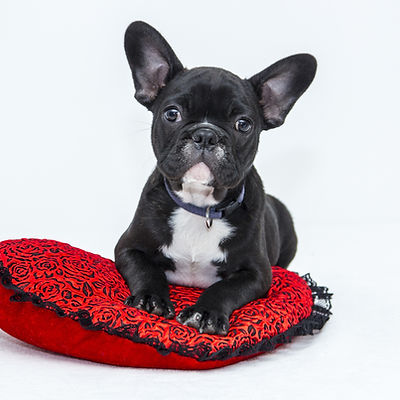
PUPPY INFORTMATION
PUPPIES 8-10 weeks - JUST too ADORABLE. Huggable, easily picked up and held in your arms or your child’s lap. Usually good with young kids, because they are good with everything & not terribly active / focused at this age.
PUPPIES 10-14 weeks - THESE ARE STILL VERY CUTE, more active, but still able to be picked up, held & loved upon. Also, usually still appear to be good with young kids, as they are still rather gentle with their mouth. Their activity level is definitely increasing, though.
PUPPIES 16-20 weeks - OH, BOY – that cute little puppy has now had a growth spurt – and is starting to not be quite so easily picked up. Their activity level continues to increase and they may start nipping, play-biting too hard or playing too rough with small children.
PUPPIES 5 months to 10 months old - OH, MY GOODNESS – WHAT HAPPENED TO THAT CUTE LITTLE 8 WEEK OLD PUPPY?!!!
If you are adopting a “large” breed – the 5-month-old puppy may easily be 40 lbs. or larger than and as large as your small child (the child for whom you got the cute little 8 week old puppy!) – and it has only been a matter of 3 months! (Your 1 year old is still 1 and your 2 year old is still 2!)
At approximately 5 months of age, that cute little puppy may not follow you around the house and yard as readily as when it was 8 – 16 weeks of age. The puppy is showing signs of maturity and independence, and even with the best of obedience training having been started at 12 weeks of age, this 40+ lb. puppy may be having serious selective hearing problems!
Activity level increases to its maximum during this period. If their energy is not properly channeled, puppies can get destructive, have unexpected in-house accidents, and can accidentally knock small children over/nip in play – hard enough to scare a small child.
This activity level may require anywhere from 2 to 6 hours of focused attention on the puppy per day.
Dogs are descendants of wolves and wolves live in groups, or packs. Each pack has a leader, called the “alpha” or dominant wolf, and a hierarchy (ranking) of all of the other members of the pack. Dogs possess pack traits, and as such, look at whatever “unit” they are part of to be their pack. Your puppy’s pack is you and the rest of your family, and this is the time period in which the puppy is trying to figure out its place in the pack.
You may have seen small signs while the puppy was younger, but usually it’s hard to tell whether the puppy has a desire to be dominant until about this age. At this age, a puppy can look upon small children as pack mates, and decide that it needs to demonstrate who is higher in rank. For dogs, growling, snarling, and snapping to keep/get objects, “protecting” special locations or food, or simply trying to receive attention first/go into or out of the house first, can demonstrate this. The puppy may also do these things if a child approaches while it is napping on a place it normally isn’t allowed or its favorite spot. The puppy may have previously allowed the child to approach but now it is testing its rank and its ability to be left alone when desired. The puppy may never do this to an adult, but a child may appear more equal/less in rank at this age.
At this age, the puppy will play harder and may be more insistent about keeping a special toy/rawhide. The activity level and rambunctious level of play may now well outstrip the ability of the child to enjoy the puppy – and at this age, it’s really hard to keep a puppy ‘playing easy’.
The hierarchy issues may never be a factor with the puppy you choose, however, the activity level and rough play are true of 99% of all puppies. If your young child cannot handle the size and activity level of a 10-month-old puppy – who can now easily be 50-80 lbs. or more – do not adopt one. Your child will only be 8 months older, but the dog will be very close to its adult size – with an activity level that is very high, with selective hearing, and in great need of attention and training.
Even if you adopt a puppy that will grow up to be a small dog, you will still have to face the activity level challenge – and possibly to an even greater extent! Terriers, which tend to be small, can also be VERY active (a/k/a hyper!). They often can be very nippy and can have BIG ATTITUDES!
PUPPIES are great – but they are a lot of work and they are a work in progress. If you do not have the time or energy for a puppy that is 5 – 10 months of age, please don’t adopt a cute little 8 week old puppy that cuddles in your arms – they grow, they need lots of attention, and become what you put into them!
